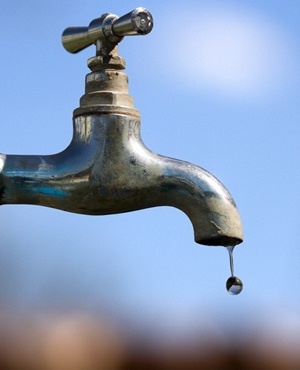
Paris – The world has abundant freshwater but it is unevenly distributed and under increasing pressure, UN agencies say, as highlighted by the severe shortages in Cape Town.
Water, water 'everywhere'
More than 97% of the planet's water is salty, most of it in the oceans and seas, but there is also a good supply of freshwater.
Every year around 42.8 trillion m3 of renewable freshwater circulates as rain, surface water or groundwater, according to the UN's Food and Agriculture Organisation (FAO).
This equals 16 216 litres per person per day – four times the amount required in the United States, for example, for personal and domestic consumption, industry and agriculture.
Depending on diet and lifestyle, a person needs between 2 000 and 5 000 litres of water a day to produce their food and meet their drinking and sanitation requirements, the FAO says.
About 60% of the planet's freshwater reserves is locked in the Antarctic.
Of the rest, more than a quarter is in Central and Latin America, which is 60 times more than that available in the Middle East and North Africa.
"The fact is there is enough water to meet the world's growing needs, but not without dramatically changing the way water is used, managed and shared," the United Nations said in 2015.
"The global water crisis is one of governance."
Shortages
In its most recent data (2014), the FAO said 45 countries were experiencing water shortages, defined as less than 1 000m3 per person a year. They include South Africa, Cyprus and Morocco.
Twenty-nine of them, including Algeria, Israel or Qatar, were in a situation of extreme shortage with less than 500m3 per person a year.
A third of the planet's population depends on groundwater and the UN has warned of the danger of overusing these reserves.
Groundwater reserves in part of India's Ganges basin, southern Spain, Italy and California's central valley could be drained dry in decades, it says.
Countries like Canada, Russia and Peru use just 1% of their renewable freshwater.
But others far overuse supply, such as Israel at 261% and Bahrain at 8 935%.
Countries that use more than their renewable supply draw from nonrenewable underground water or desalinate sea water, as in the case of Bahrain.
Cities in difficulty
Freetown, La Paz and Ouagadougou in 2016 suffered severe water shortages following drought, much as Cape Town is today.
The global use of freshwater doubled between 1964 and 2014 because of population growth, urbanisation, industrialisation and increased production and consumption, the UN says.
The demand for water in cities is expected to grow by 50 percent by 2030.
"Water scarcity, exacerbated by climate change, could cost some regions up to 6% of their GDP, spur migration, and spark conflict," the World Bank said in 2016.
Thirsty farming
Farming is the single biggest consumer of water globally (70%), most of it for irrigation. Industry uses 19% and households 11%, according to the FAO.
But there are wide disparities at the regional level. In South Asia agriculture accounts for 91% of water use, against only 7% in homes and 2% in industry.
In the European Union and North America, however, industry consumes more than half of freshwater supply, ahead of agriculture (under 34%) and domestic use (under 18%).
Global warming
The UN's climate science panel, the IPCC, said in a 2014 report that for every 1°C of global warming, about 7% of the world's population will see a drop of at least 20% in renewable water resources.
Scientists calculate the planet has already warmed by 1°C since the Industrial Revolution kickstarted the spewing of man-made, planet-heating gases into the atmosphere.
The IPCC projects more frequent and severe droughts in already dry regions, reducing surface water and groundwater stocks. The impact will depend on the level of warming.
SOURCES: AFP, American Geophysical Union (AGU) conference (2016), FAO, Intergovernmental Panel on Climate Change (IPCC), UN-Water, World Bank.
The World Bank advises that data on water should be treated with caution given variations in national collection methods and seasonal and annual sampling.
KEEP UPDATED on the latest news by subscribing to our FREE newsletter.
- FOLLOW News24 on Twitter




 Publications
Publications
 Partners
Partners























